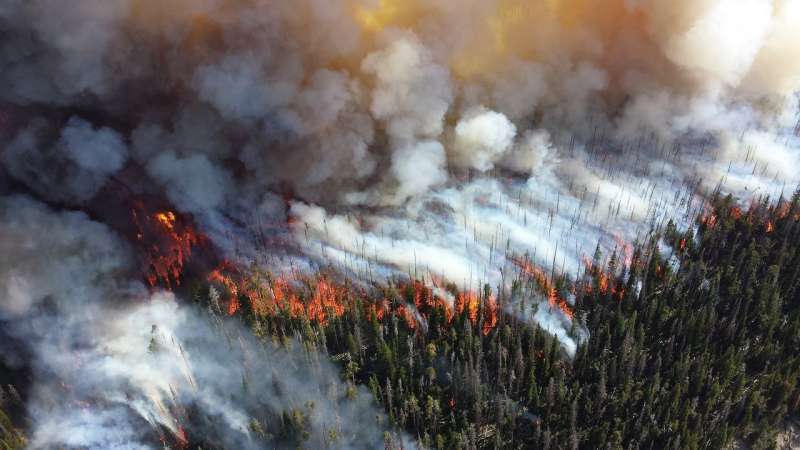Credit: CC0 Public Domain
A new study in The Auk: Ornithological Advances suggests that wildfires change the types of songs sung by birds living in nearby forests.
Hermit Warblers sing a formulaic song to attract mates, in contrast with a repertoire of more complex songs they use to defend territories. There is often a single, dominant formulaic song within the same geographic area. In the United States, the summer range of Hermit Warblers is limited to the Pacific Coast states of California, Oregon, and Washington.
Hermit Warblers appear especially sensitive to fire and other disturbances over short periods of time. They are negatively impacted immediately after low severity fires or selective timber harvests but respond positively to the resulting changes in forest structure and increasing insect populations over longer periods of time.
Bird song has been proposed as one measure for understanding how biodiversity is maintained within an ecological community. Song learning via imitation, in conjunction with cultural drift, often leads to the development of sets of geographically distinct song variants within bird species.
Researchers here recorded the formulaic songs from 1,588 males across 101 study sites in the state between 2009 and 2014. The results provide the first comprehensive description and mapping of Hermit Warbler songs throughout California. The researchers classified the songs into 35 dialects. Researchers also modeled the effects of recent fire history at the local scale, the amount of breeding habitat at the regional scale, and the distance between territories to examine factors involved in song diversity.
The researchers found that song dialects tended to be isolated from each other within different forest types, but that in contrast, local song diversity increased with the amount of local fire and regional habitat. Using a longitudinal analysis of additional data from ten study areas revisited in 2019, the researchers here also showed that song structure had begun to change since the initial visits 5-10 years earlier, and that the diversity of song forms increased at locations that had been burned by wildfire between visits. Taken together the results suggest that wildfires, the mass effects of dispersal of birds singing rival song forms, and time all disrupt the uniformity of songs locally.
"Our surveys suggest that song dialects arose in sub-populations specialized to different forest types," said the paper's lead author, Brett Furnas. "Over the longer term, fire caused some birds to flee and created a vacuum for other birds to fill. The net result is that some areas now have birds singing more than one dialect resulting in a complex diversity of songs throughout California."
More information: "Wildfires and Mass Effects of Dispersal Disrupt the Local Uniformity of Type I Songs of Hermit Warblers in California," The Auk: Ornithological Advances, DOI: 10.1093/auk/ukaa031
Provided by Oxford University Press
























